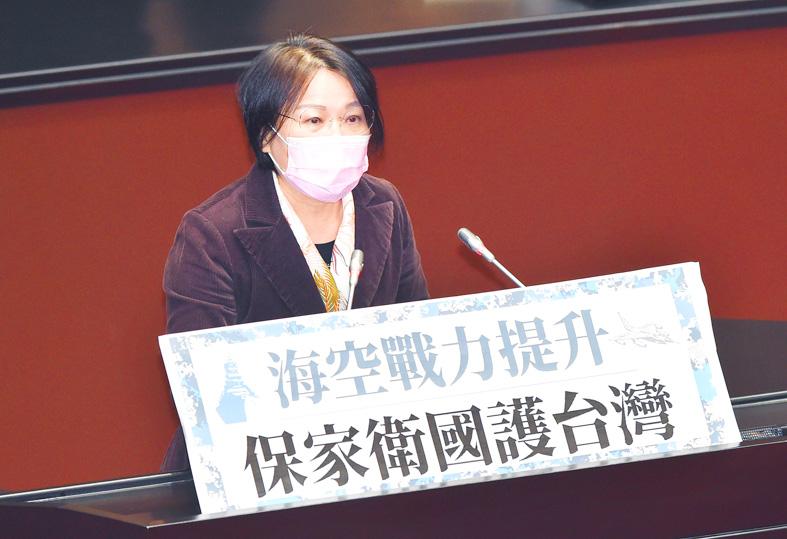Democratic Progressive Party Legislator Liu Shyh-fang (劉世芳) on Monday called on the government to treat Phoenix Television as a Chinese state-owned media company, after China’s State Council became a majority shareholder of the company.
State Council-funded Bauhinia Culture Holdings Ltd in April last year bought 21 percent of the shares of Hong Kong-based Phoenix Television, becoming a majority shareholder, Liu said.
Chinese state-owned China Mobile also owns 19.68 percent of Phoenix Television shares, Liu added.

Photo: Liao Chen-huei, Taipei Times
Phoenix operates in Taiwan and other countries outside of China, where it airs content in Mandarin and Cantonese.
“There is no private media company in China. The government must recognize that Phoenix Television is now under the control of the Chinese Communist Party [CCP],” she said.
In its latest report on Hong Kong, the Mainland Affairs Council said the investment in Phoenix was part of Beijing’s plans to control all publications and media in the territory.
However, Phoenix Television was already connected to the CCP before the investments, a source said.
Company founder and CEO Liu Changle (劉長樂) previously served as an officer and political instructor in the Chinese People’s Liberation Army, and later became a journalist for CCP-controlled China National Radio, the source said, adding that Liu is a standing member of the National Committee of the Chinese People’s Political Consultative Conference.
Xu Wei (徐威), the company’s board chairman, was formerly a Shanghai municipal government official, as well as China Central Television deputy director, the source said, adding that Xu is now responsible for content planning and production at Phoenix.
“As Phoenix is effectively a channel for CCP propaganda, its operations in Taiwan should be restricted under current laws,” the source said.
If recognized simply as a media company funded by Chinese investors, it would not be permitted to employ more than 10 Taiwanese, and if recognized as a Chinese state-owned media outlet it would not be permitted to hire any Taiwanese, the source said.
All of the employees at the Taiwan division of Phoenix are Taiwanese, the source said.
According to stipulations in the Measures Governing Investment Permits to the People of the Mainland Area (大陸地區人民來台投資許可辦法), Phoenix Television should already be considered a company funded by Chinese investment as more than 30 percent of its shares are owned by Chinese investors, Economic Democracy Union researcher Chiang Min-yen (江旻諺) said.

‘DENIAL DEFENSE’: The US would increase its military presence with uncrewed ships, and submarines, while boosting defense in the Indo-Pacific, a Pete Hegseth memo said The US is reorienting its military strategy to focus primarily on deterring a potential Chinese invasion of Taiwan, a memo signed by US Secretary of Defense Pete Hegseth showed. The memo also called on Taiwan to increase its defense spending. The document, known as the “Interim National Defense Strategic Guidance,” was distributed this month and detailed the national defense plans of US President Donald Trump’s administration, an article in the Washington Post said on Saturday. It outlines how the US can prepare for a potential war with China and defend itself from threats in the “near abroad,” including Greenland and the Panama

A wild live dugong was found in Taiwan for the first time in 88 years, after it was accidentally caught by a fisher’s net on Tuesday in Yilan County’s Fenniaolin (粉鳥林). This is the first sighting of the species in Taiwan since 1937, having already been considered “extinct” in the country and considered as “vulnerable” by the International Union for Conservation of Nature. A fisher surnamed Chen (陳) went to Fenniaolin to collect the fish in his netting, but instead caught a 3m long, 500kg dugong. The fisher released the animal back into the wild, not realizing it was an endangered species at

The High Prosecutors’ Office yesterday withdrew an appeal against the acquittal of a former bank manager 22 years after his death, marking Taiwan’s first instance of prosecutors rendering posthumous justice to a wrongfully convicted defendant. Chu Ching-en (諸慶恩) — formerly a manager at the Taipei branch of BNP Paribas — was in 1999 accused by Weng Mao-chung (翁茂鍾), then-president of Chia Her Industrial Co, of forging a request for a fixed deposit of US$10 million by I-Hwa Industrial Co, a subsidiary of Chia Her, which was used as collateral. Chu was ruled not guilty in the first trial, but was found guilty

DEADLOCK: As the commission is unable to forum a quorum to review license renewal applications, the channel operators are not at fault and can air past their license date The National Communications Commission (NCC) yesterday said that the Public Television Service (PTS) and 36 other television and radio broadcasters could continue airing, despite the commission’s inability to meet a quorum to review their license renewal applications. The licenses of PTS and the other channels are set to expire between this month and June. The National Communications Commission Organization Act (國家通訊傳播委員會組織法) stipulates that the commission must meet the mandated quorum of four to hold a valid meeting. The seven-member commission currently has only three commissioners. “We have informed the channel operators of the progress we have made in reviewing their license renewal applications, and